What would a computer cook for dinner?
- Published
LJ Rich has a taste of a meal generated by the number-crunching cleverness of IBM's Watson supercomputer.
Anybody who has been to British chef Heston Blumenthal's world-famous Fat Duck restaurant in the UK village of Bray will know that strange flavours do work together.
There egg and bacon ice cream, snail porridge and tobacco-infused chocolate were born.
Blumenthal has acquired something of a mad scientist reputation - half chef, half molecular physicist - but even he might raise an eyebrow at the possibility that a computer could create such daring and flavoursome recipes.
But that is exactly what IBM is setting out to do as its increasingly intrepid supercomputer Watson takes on that most human of activities - cooking.
Watson's flavourbots will be churning out recipes at the annual interactive, film and music festival SXSW, offering visitors to its base in Austin, Texas some hopefully algorithmically delicious dishes, served via a food van.
Conference goers will be asked to vote on the dishes that they would like Watson to cook each day via Twitter using the #IBMFoodTruck hashtag.
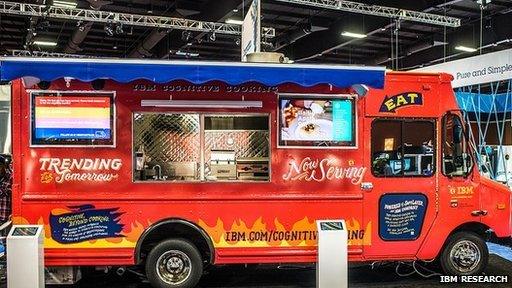
Behind this food truck is a cognitive computer dreaming up algorithmically delicious dishes
There are hundreds of thousands of different flavour combinations in the world so the idea that an algorithm is best placed to sort through them to come up with some novel ways to tickle our taste-buds isn't as strange as it may sound.
Watson will sift through some weird and wonderful ingredients and attempt to come up with some original but tasty new recipes.
So how do you fancy Italian grilled lobster followed by Baltic apple pie?
"We made an Italian grilled lobster that paired saffron, tomato, pumpkin, mint, olives, orange and bacon - something that we would never have thought of putting all together," said Florian Pinel, senior software engineer at IBM Watson Group.
"The Baltic apple pie... with apple, blueberries, apricots, ginger, pork, garlic and onion is another recipe that you won't find at any bakery I know of," he added.
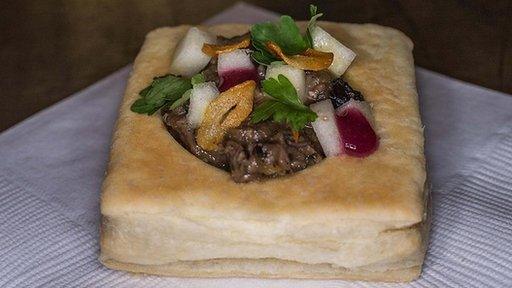
Baltic Apple Pie might shock eaters when they hit the pork layer
To help it in its task to become a Michelin-starred cyborg chef Watson will have access to a database of recipes containing tens of thousands of existing dishes.
A second database will provide data on the flavour compounds in thousands of ingredients and it will also have to hand psychological data about how humans perceive different flavour combinations.
Watson will not be cooking up its own creations, largely because it has no hands.
Instead the food it creates at SXSW will be cooked by a group of chefs from the Institute of Culinary Education (ICE).
IBM is keen to stress that this is not about machines outdoing humans but rather working side by side with them.
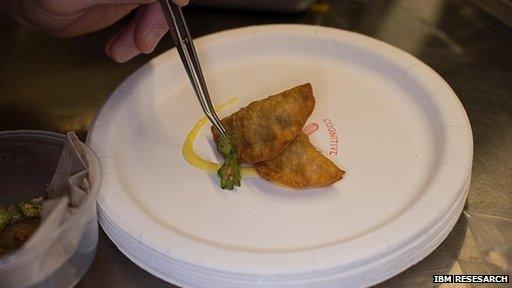
Creole Shrimp Dumplings is one of the dishes the computer has created in the past
"An important aspect of this research is pairing human creativity with machine creativity to create the best possible outcomes and results," said Mr Pinel.
"We want chefs to see our system as a useful assistant that magnifies and accelerates their abilities, and to do things they never could have done before."
The system will prioritise the most strange and bizarre recipes not just because a machine-generated meat-and-two-veg dish is likely to disappoint but also because the serious point behind the exercise is to prove that computers can be creative.
"When dealing with scientific creativity, today's big data lets computers assess the products that they create in terms of novelty and quality," said Mr Pinel.
"The fact that the computers can both design and evaluate artefacts means to me that they're being creative."
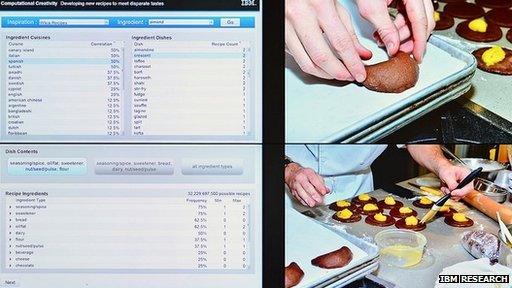
How exactly does a computer cook up its recipes?
Increasingly machines are being pitted against humans and winning unlikely challenges.
In 2011 Watson took on two of the world's best Jeopardy players, a general knowledge quiz.
During that quiz Watson showed off some pretty impressive skills - being able to answer complicated and nuanced questions without being connected to the internet.
It is increasingly common to find artificial intelligence agents trawling through massive amounts of data to come up with solutions to a whole range of problems.
But the idea that computers could also be ready to get creative is one that some will find disturbing.
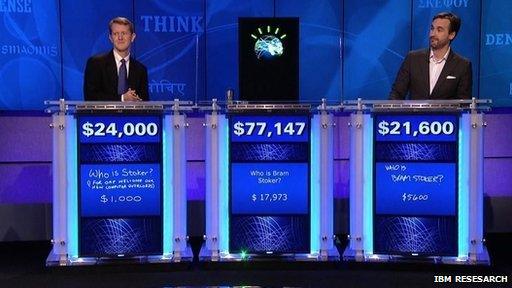
Watson is also pretty good at answering general knowledge questions
Nonetheless artificial intelligence agents have proved their artistic bent, writing music, painting pictures, even attempting to write articles.
It has led the Singularity University - a group of forward-thinking technologists based at the Nasa research park - to predict that the Turing test - where computers are able to match human intelligence - will be reached as soon as the 2020s.
Brad Templeton works at the institution and he has no doubt that creative computers will become standard.
"We will one day build computers that are smarter than human beings and part of that will mean computers being able to express creativity and emotions in the way that we do," he told the BBC.
Nutritional food
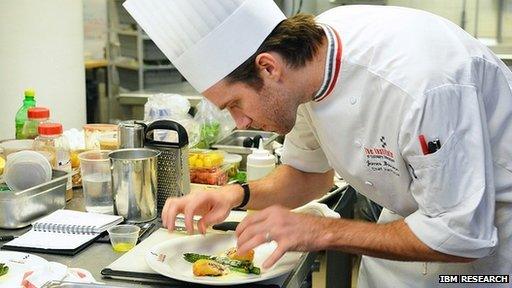
Even a super-smart computer needs some real chefs to help put the recipes together
Turning Watson into a chef is more than just a fun project for IBM - there could also be practical applications for the robot recipes.
"There's an opportunity to make a societal impact and tackle the challenges of obesity, malnutrition and hunger," said Mr Pinel.
Its recipes could be used by food manufacturers, school lunch providers and chefs who are all striving to create foods that satisfy people's various tastes and preferences while also making them healthy and rich in nutrients.
"By using computational creativity technologies to analyse the chemical compounds and ingredients, food professionals can identify new recipes and pairings that are not only tasty and healthy, but also efficient to produce," he added.
IBM is desperate to make money out of Watson and these days its cognitive computer has its fingers in many pies.

Can Watson help solve malnutrition?
It is helping oncologists find treatments for cancer in New York, it has been launched in Africa to help solve problems caused by poverty and disease and recently IBM opened the system up to app developers.
Whether IBM can find a way to make money out of artificial intelligence remains to be seen.
Meanwhile though the proof of the pudding, even for a robot, is in the eating.
So what do the human chefs challenged to put together Watson's gastronomic delights think of their new rival?
Michael Laiskonis, creative director at the ICE, seems to be a convert.
"The entire process of working with the system thus far has forever altered how I approach creativity from a chef's perspective," he said.
Heston Blumenthal better watch out.
- Published27 February 2014
- Published6 February 2014
- Published17 January 2014